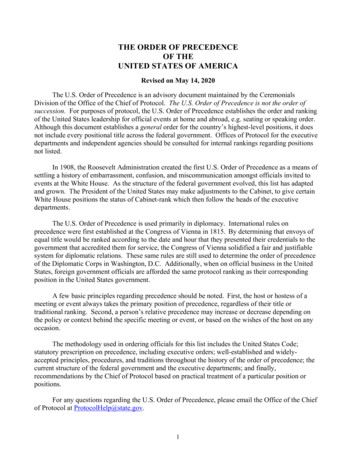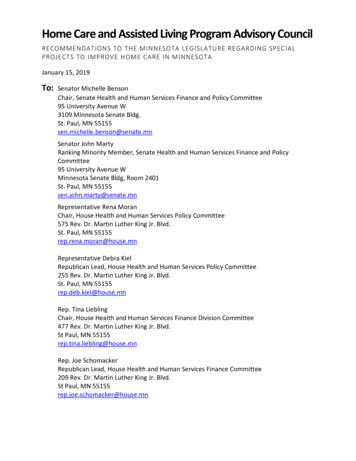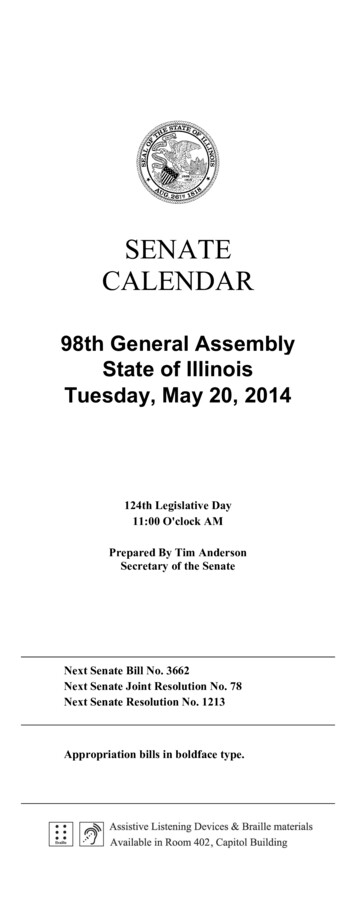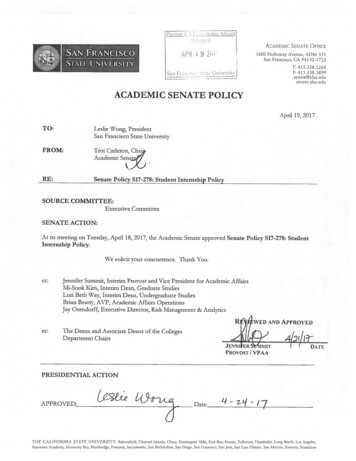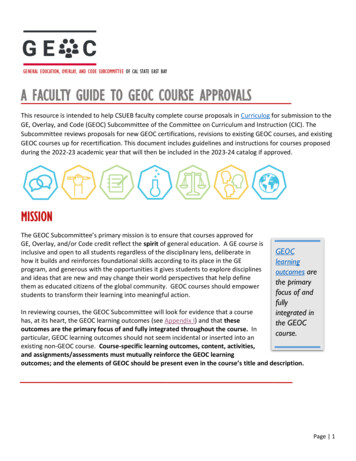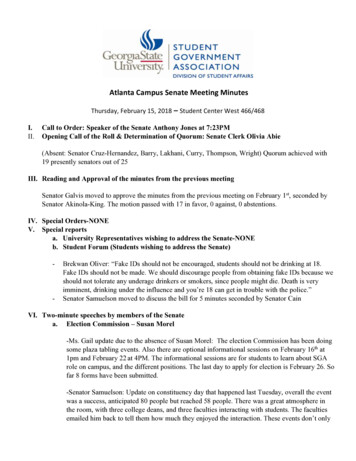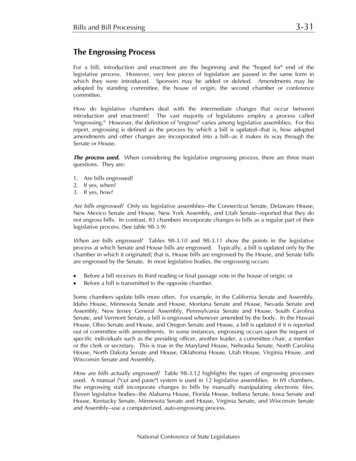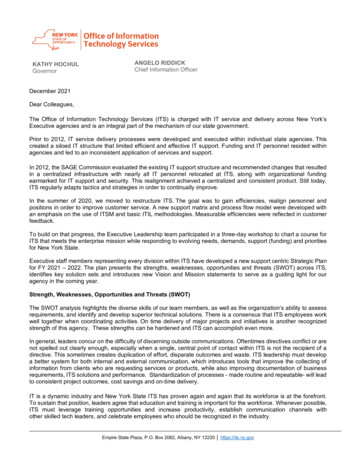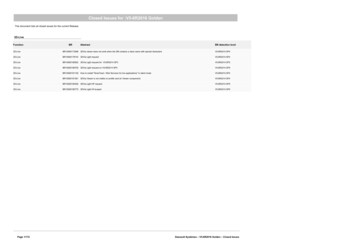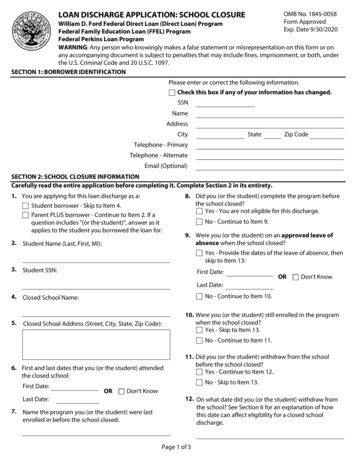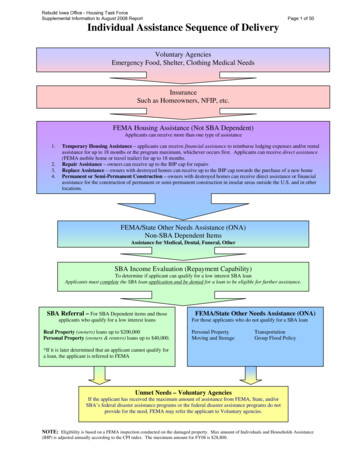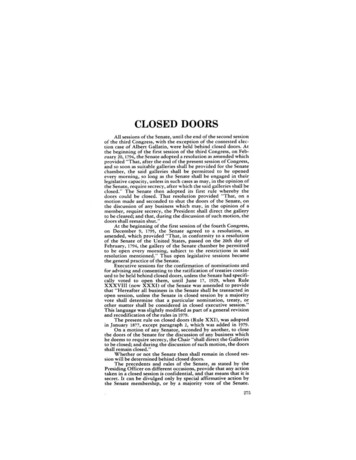
Transcription
CLOSED DOORSAll sessions of the Senate, until the end of the second sessionof the third Congress, with the exception of the contested election case of Albert Gallatin, were held behind closed doors. Atthe beginning of the first session of the third Congress, o n February 20,1794, the Senate adopted a resolution as amended whichprovided "That, after the end of the present session of Congress,and so soon as suitable galleries shall be provided for the Senatechamber, the said galleries shall be permitted to be openedevery morning, so long as the Senate shall be engaged in theirlegislative capacity, unless in such cases as may, in the opinion ofthe Senate, require secrecy, after which the said galleries shall beclosed." The Senate then adopted its first rule whereby thedoors could be closed. That resolution provided "That, on amotion made and seconded to shut the doors of the Senate, onthe discussion of any business which may, in the opinion of amember, require secrecy, the President shall direct the galleryto be cleared; and that, during the discussion of such motion, thedoors shall remain shut."At the beginning of the first session of the fourth Congress,on December 9, 1795, the Senate agreed to a resolution, asamended, which provided "That, in conformity to a resolutionof the Senate of the United States, passed on the 20th day ofFebruary, 1794, the gallery of the Senate chamber be permittedto be open every morning, subject to the restrictions in saidresolution mentioned." Thus open legislative sessions becamethe general practice of the Senate.Executive sessions for the confirmation of nominations andfor advising and consenting to the ratification of treaties continued to be held behind closed doors, unless t h e Senate had specifically voted to open them, until June 17, 1929, when RuleXXXVIII (now XXXI) of the Senate was amended to providethat "Hereafter all business in the Senate shall be transacted inopen session, unless the Senate in closed session by a majorityvote shall determine that a particular nomination, treaty, orother matter shall be considered in closed executive session."This language was slightly modified as part of a general revisionand recodification of the rules in 1979.The present rule o n closed doors (Rule XXI),was adoptedin January 1S77, except paragraph 2, which was added in 1979.On a motion of any Senator, seconded b y another, to closethe doors of the Senate for the discussion of any business whichhe deems to require secrecy, the Chair "shall direct the Galleriesto be closed; and during the discussion of such motion, the doorsshall remain closed."Whether or not the Senate then shall remain in closed session will be determined behind closed doors.T h e precedents and rules of the Senate, as stated by thePresiding Officer on different occasions, provide that any actiontaken in a closed session is confidential, and that means that it issecret. It can he divulged only by special affirmative action bythe Senate membership, or by a majority vote of the Senate,
276SENATE PROCEDUREUnder paragraph 2 of Rule XXIX, when acting on confidential or executive business, unless the same shall be considered in open executive session, the Senate Chamber shall becleared of all persons except the Secretary, the Assistant Secret a r y , the Principal Legislative Clerk, the Parliamentarian, theExecutive Clerk, the Minute and Journal Clerk, the Sergeant atArms, the Secretaries to the Majority and the Minority, and suchother officers as the Presiding Officer shall think necessary; andall such officers shall be sworn to secrecy.Rule XXIX, Paragraph 5, provides that "Any Senator orofficer of the Senate who shall disclose the secret or confidentialbusiness or proceedings of the Senate shall be liable, if a Senator,to suffer expulsion from the body; and if an officer, to dismissalfrom the service of the Senate, and to punishment for contempt."Under the precedents of the Senate, as ruled by the Chair,"closed sessions arc called for under Rule XXI and proceedingsof closed sessions are controlled in part by Rules XXIX andXXXI."The Presiding Officer has reminded the Senate that underprecedents in a closed session the entire proceedings are secret; a Senator, at any later date, may comment on thegeneral nature of the subjects discussed in closed session butthese comments m a y in no way refer specifically to what wastransacted therein, unless o r until the Senate, by a majority vote,releases the injunction o f secrecy on those proceedings. Continuing, he stated that it is not in order for any Senator to divulgeany specifics discussed therein, "or which Senator said what, orwhat proceedings took place, or how any Senator voted, unlessthere is specific affirmative action by the Senate to remove thatinjunction."t h e rules andRule XXI[Closed Sessions of Senate]1. On a motion made and seconded to close the doors of the Senate,on the discussion of any business which may, in the opinion of aSenator, require secrecy, the Presiding Officer shall direct the galleries t o be cleared; and during the discussion of such motion the doorsshall remain closed.2. When the Senate meets in closed session, any applicable provisions of rules XXIX and XXXI, including the confidentiality of information shall apply to any information and to the conduct of anydebate transacted.Rule XXIX, Paragraphs 2-5[Persons Entitled to Floor in Closed Session andConfidentiality of Information]2. When acting upon confidential or Executive business, unless thein open Executive session, the Senate Chamher shall be cleared of all persons except the Secretary,the AssistantSecretary, the Principal Legislative Clerk, the Parliamentarian, theExecutive Clerk, the Minute and Journal Clerk, the Sergeant atsame shall be considered
CLOSED DOORS277Arms, the Secretaries to the Majority and the Minority, and suchother officers as the Presiding Officer shall think necessary; and allsuch officers shall be sworn to secrecy.3. All confidential communications made by the President of theUnited States to the Senate shall be by the Senators and the officersof the Senate kept secret; and all treaties which may be laid beforethe Senate, and all remarks, votes, and proceedings thereon shall alsobe kept secret, until the Senate shall, by their resolution, take off theinjunction of secrecy.4. Whenever the injunction of secrecy shall be removed from anypart of the proceedings of the Senate in closed Executive or legislativesession, the order of the Senate removing the same shall be entered inthe Legislative Journal as well as in the Executive Journal,and shallbe published in the Congressional Record under the direction of theSecretary of the Senate.5. Any Senator or officer of the Senate who shall disclose the secretor confidential business or proceedings of the Senate shall be liable, ifa Senator, to suffer expulsion from the body; and if an officer, todismissal from the service of the Senate, and to punishment for contempt,Rule XXXI, Paragraph 2[Closed Sessions on Nominations]All business in the Senate shall be transacted in open session,unless the Senate as provided in rule XXI by a majority vote shalldetermine that a particular nomination,treaty, or other matter shallbe considered in closed executive session, in which case all subsequent proceedings with respect to said nomination, treaty, or othermatter shall be kept secret: Provided, That the injunction of secrecyas to the whole or any part of proceedings in closed executive sessionmay be removed on motion adopted by a majority vote of the Senatein closed executive session: Provided further, That any Senator maymake public his vote in closed executive session.Closed Session-Privileged Motion:A motion to close the doors under Rule XXI is privileged and not debatable; and when a motion is made byone Senator and seconded by another Senator that theSenate go into closed session, that motion under Rule XXIis immediately effective without debate.2A motion to close the doors under Rule XXI, when madeand seconded during the discussion of business which inthe opinion of a Senator requires secrecy, may be made' June 10,1884,48-1, Record, p. 4959;June 11,1884,48-1,Record, pp. 5000-01. TheChair in the closed session of May 4,1972, referred to the number of closed sessions inrecent years.See May 4.1972,92-2,Record, p. 15965-66.Apr. 2G,1983,98-1, Record, pp. 9692-93.
278SENATE PROCEDUREover the objection of the Senator in possession of thefloor,3 even to the extent of taking the Senator from thefloor against his consent.4A closed session, under Rule XXI, can be invokedsimply by a motion and a second,and the question is notdebatable. Once the Senate goes into closed session, itmay then determine whether it stays in closed sessiom5Under Rule XXI, any Senator may move to go intoclosed session, and if seconded by another Senator, therule is automatic.When a motion is made t o close the doors under RuleXXI, and seconded, a parliamentary inquiry is not inorder nor is an appeal from the decision of the Chair;theapplication and enforcement of the rule are automaticand the galleries must be c l e a r d 7A motion to close the doors for secret legislative business precludes an explanation therefor. Any explanationshould be made before the motion is made,8 but on May 2,1972, the Presiding Officer entertained a point of orderonly long enough to answer and then ordered the galleriesclosed.A Senator has a right to have read, or he may read, aresolution submitted by him, but any Senator, if he deemsthe matter one requiring secrecy, may, under the rule,interrupt such a reading to move that the doors beclosed.Closed Session-Procedure by Chair:Form of statement by Chair after motion had beenmade and seconded to go into closed session under RuleXXI on July 14,1966 is as follows:The motion having been made and seconded that the Senate go intoclosed session, the Chair, pursuant to Rule XXI, now directs the Ser3 Feb. 6, 1903, 57-2, Record, p. 178% Jan. 15, 1912,62-2,Record, pp. 942-43;Feb. 6,1917,64-2,Record, 2667;see Apr. 25,1972,92-2,Record, p. 14084.Jan. 15,1912,6&2, oumaâ‚p.79.Record, pp.842-43.See May 2,1972,92-2, Record, p 15287,15308,May 4,1972.92-2,Record, p. 1597172;Sept. 21,1979,96-1,Record,p. 25667.See July 9,1969,91-1,Record, pp 18856-57.See Aug. 14, 1958, 85-2, Record, pp. 17601-03; Aug. 16, 1958, 85-2,Record, pp.18026-28;for details on closed session of July 14,1966Ñth edited version seeRecordof July 27,1966. DD. 16581-602:number of closed sessionssee Record for Oct. 2,1968.90-2, p. 29180." June 26,1942,V-2,R d ,p. 5614.See May 3, 1972, 92-2, Record, pp. 15287, 15308; May 4, 1972, 92-2. Record, pp.* *15957- -72-.-.loMar, 17,1905,594pecial&asion, Recod, p. 19.
CLOSED DOORS279geant at Arms to clear the galleries and to close the doors and that allofficials of the Senate not cleared for secrecy be excluded. 'Closed Session-Proceedings Under:See also "Definition of Secrecy in Closed Sessions," p. 279.Closed sessions are called for under Rule XXI and proceedings in closed sessions are controlled in part by RulesXXIX and XXXI.Closed Session-When Adjourn in:If the Senate adjourns in closed session, it will returnthe next day in closed session.Definition of Secrecy in Closed Sessions:In a closed session the entire proceedings are secret; aSenator, at a later date, may comment on the nature ofthe subjects discussed in closed session but these comments may in no way refer to what was transacted in theclosed session unless the Senate, by a majority vote, releases the injunction of secrecy on these proceedings.l 4It is not in order, under the closed session rule, for anySenator to divulge the details of the subject matter discussed therein, or which Senator said what, or what proceedings took place, or how any Senator voted, unlessthere is specific affirmative action by the Senate toremove that injunction.Executive Business:A motion to print in the Congresswnal Record a yea andnay vote on a nomination in closed session can only bemade in executive sessi0n.1 I*See also proceedings for July 17,1969,91-1, Record, p. 19848-49.July 14,1966.88-2, Record, pp. 15676-98.May 2, 1972, 92-2, Record, p. 15302; May 31, 1972, 92-2, Record, pp. 19408-09."July 14, 1966, 89-2, Record, pp. 15667-98; see Nov. 20, 1975, 94-1, R#h, pp.121837555-56.' 5 Ihid.May 21,1929,71-1, Record, p. 1598.
280SENATE PROCEDURENew Closed Session May Act on Business in aPrior One:In a subsequent closed session the Senate "can take upmatters that were discussed in a previous secret session." 17Open Session-Return to:When in closed session, a motion to return to open session is in order and not debatable.l 8Persons Entitled to Floor Privilege:Rule XXIX, paragraph 2, sets forth persons entitled tothe privilege of the floor of the Senate during a closedsession,19which also authorizes admission of "other officers as the Presiding Officer shall think necessary." 2 0 Allpersons are sworn to e c r e c y .Additional personnel mayattend by unanimous consent.22Secrecy Injunction Lifted:If a motion is made to make public the proceedings oftwo closed sessions,that question is divisible, but a motionto make public the proceedings in a closed session wouldbe in order based on earlier practices of the Senate.23On March 3, 1978, three Unanimous Consent Agreements were adopted in closed session for expurgating andreleasing the proceedings taken in closed sessions onMarch 3 and 4 2 4All persons attending a closed session are sworn to secrecy until the injunction of secrecy is removed, subject topenalty as provided in Rule XXIX, paragraph 3.25May 2 and 4,1972,92-2, Record, pp. 15301-02,15968-69.See May 2,1972,92-2, Rtecorripp. 15298-99.l n July 9,1969,91-1, Record, p. 18857;July 14,1966,89-2, Reconi, pp. 15677-98; July1, iYi'7,95-1, Becod, pp. 22006-07.July 9,1969,91-1, Record, p. 18857.2 1 May 2, 1972, 92-2, Record, p. 15297; July I , 1977, 95-1, Record, pp. 22006-OT.2 2 July 9, 1969, 91-1, Record, p. 18857; June 4, 1975, 94-1, Record, pp. 17066-67.See May 2,1972.92-2, Record,pp. 15297-302; May 4,1972.92-2, Amorat, pp. 1596869.** See proceedings for Mar, 3,1978,95-2, Record,pp. 3970-71,4W7.May 2,1972,92-2, Record, p. 15297.IT
CLOSED DOORS281Form of a unanimous consent order to authonw offiicialreporters to take shorthand in the closed session on July14,1966:Ordered, That the official reporters be authorized to take proceedin shorthand but that they not be transcribed; and, when the session is concluded, they be placed in. thecustody of the Secretary of the Senate and kept secret by him alongwith other minutes and matters of such nature already in his custody.ings of the closed session
CLOSED DOORS All sessions of the Senate, until the end of the second session of the third Congress, with the exception of the contested elec- tion case of Albert Gallatin, were held behind closed doors.At the beginning of the first session of the third Congress, on Feb- ruary 20,1794, the Senate adopted a resolution as amended which provided "That, after the end of the present session of Congress,
